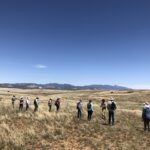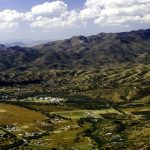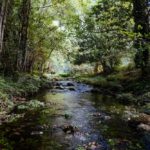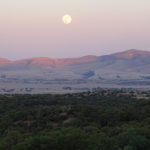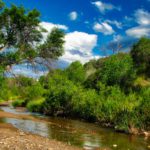
Sep 9, 2015 | Blog
 The Patagonia Area Resource Alliance and Defenders of Wildlife were in federal court in Tucson last Thursday to present oral arguments against the Forest Service’s unlawful approval of a mining exploration project in the Patagonia Mountains on the Coronado National Forest.
The Patagonia Area Resource Alliance and Defenders of Wildlife were in federal court in Tucson last Thursday to present oral arguments against the Forest Service’s unlawful approval of a mining exploration project in the Patagonia Mountains on the Coronado National Forest.
Over 20 people attended the court hearing in support of PARA, Defenders of Wildlife and the Patagonia Mountains.
Canadian mining company Regal Resources’ Sunnyside Project involves drilling six exploratory holes for copper deposits up to 6,500 feet deep roughly five miles from the Town of Patagonia.
The Forest Service issued a “categorical exclusion” decision which essentially fast-tracked the mineral drilling exploration and approved the project without doing any environmental assessments. The decision authorized Regal Resources to run drilling for one year, with a seven month stoppage during the breeding seasons of the Mexican spotted owl and Yellow-billed cuckoo.
Defenders of Wildlife Lawyer Jay Tutchton argued that the Forest Service’s approval of the Sunnyside project violates environmental laws and poses a potential threat to local, endangered species. The extensive mineral drilling and construction would run 24 hours a day, seven days a week with total project operations and reclamation lasting up to 3 years.
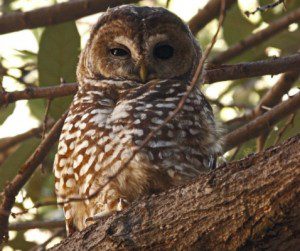
Mexican Spotted Owl ©Gooch Goodwin
The Patagonia Mountains support some of the world’s most threatened and endangered wildlife, including the jaguar, ocelot, lesser long-nosed bat, Mexican spotted owl, and yellow-billed cuckoo. Of particular concern is the Mexican spotted owl “Protected Activity Center” (PAC), prime habitat which is supposed to have the greatest protection by law and is occupied by the owls year-round. One of the project’s proposed drilling sites is less than 200 yards from a “nesting core area” of the PAC. The noise caused by the drills would be louder than a chainsaw and would disrupt about one-third of the Mexican spotted owls’ PAC, as well as the migratory corridors of jaguars and ocelots, Tutchton argued.
The Forest Service asked the court to dismiss the complaint. Forest Service lawyer Julia Thrower claimed the decision to grant a categorical exclusion complied with the National Environmental Protection Act and was not arbitrary or capricious.
“We’re optimistic that the judge will agree that the Forest Service’s attempt to avoid extra paperwork by skipping environmental assessments violates the law and places local, imperiled wildlife in even more jeopardy,” said Wendy Russell of the Patagonia Area Resource Alliance.
U.S. District Court Judge Rosemary Marquez said that she would take the matter under advisement and would issue her ruling before the proposed October 1 start date.

Apr 13, 2015 | Blog
FOR IMMEDIATE RELEASE
Kevin Pakulis Band to play benefit concert for Friends of the Mountain Empire, with special guest appearance from Congressman Raúl Grijalva
TUCSON, ARIZ. — The Kevin Pakulis Band will play a benefit concert to raise funds and awareness for the Friends of the Mountain Empire on Saturday, May 9th at the Hotel Congress in Tucson. Tickets for the magical evening of music can be purchased now to support the organizations – Patagonia Area Resource Alliance, Sky Island Alliance, Defenders of Wildlife, Tucson Audubon Society, Center for Biological Diversity and Save the Scenic Santa Ritas – that are working to protect and preserve the habitat, water, and wildlife of the Mountain Empire from new mining in the Patagonia Mountains, Santa Rita Mountains, Canelo Hills, and the San Rafael Valley of southern Arizona.

The event will provide a unique and exciting opportunity to hear the soulful music of Tucson-based, award-winning Americana singer-songwriter Kevin Pakulis, while supporting the incredible ecological and cultural biodiversity of the region.
“Our goal is to draw attention to the local organizations that play a vital role in protecting and restoring wild places in southern Arizona. More specifically, to draw attention to the message they bring – a message that deserves careful consideration, if not enthusiastic action,” said Pakulis.
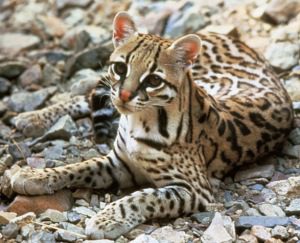
Ocelot, photo US FWS
Arizona’s southwestern Mountain Empire is a hidden gem of the country, recognized for its beauty, uniqueness and ecological importance. The region is rich in wildlife and plant diversity and supports some of the world’s most imperiled wildlife including the jaguar, ocelot, lesser long-nosed bat, Mexican spotted owl and yellow-billed cuckoo. Sadly, destructive mining projects that continue to be proposed and approved threaten not only endangered wildlife, but the water, health and safety of local communities.
The benefit will include a special guest appearance from Congressman Raúl Grijalva, who will speak to the importance of conserving the natural and local communities of the Mountain Empire in the face of such threats.
About the Event
When: Saturday, May 9th, 7:00pm – 11:00pm
Where: Copper Hall in Hotel Congress, 311 E Congress St, Tucson, AZ 85701
Who: Kevin Pakulis Band, Friends of the Mountain Empire, Congressman Raúl Grijalva
Tickets: $20 Advance/$25 At the door
For more information and to purchase advance tickets, please visit: http://www.patagoniaalliance.org/friends-of-the-mountain-empire-benefit-concert-with-kevin-pakulis/
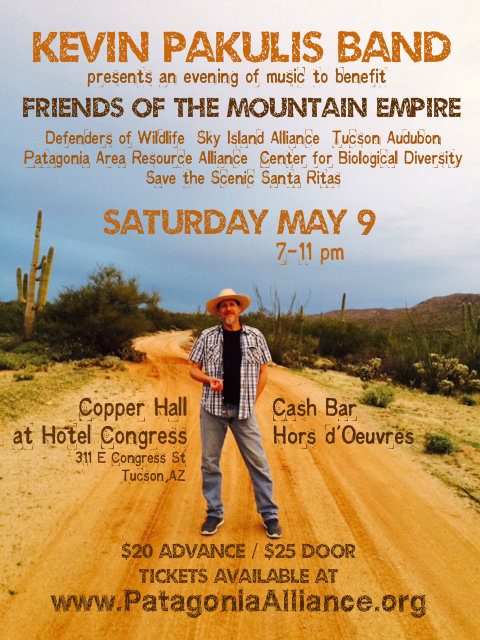
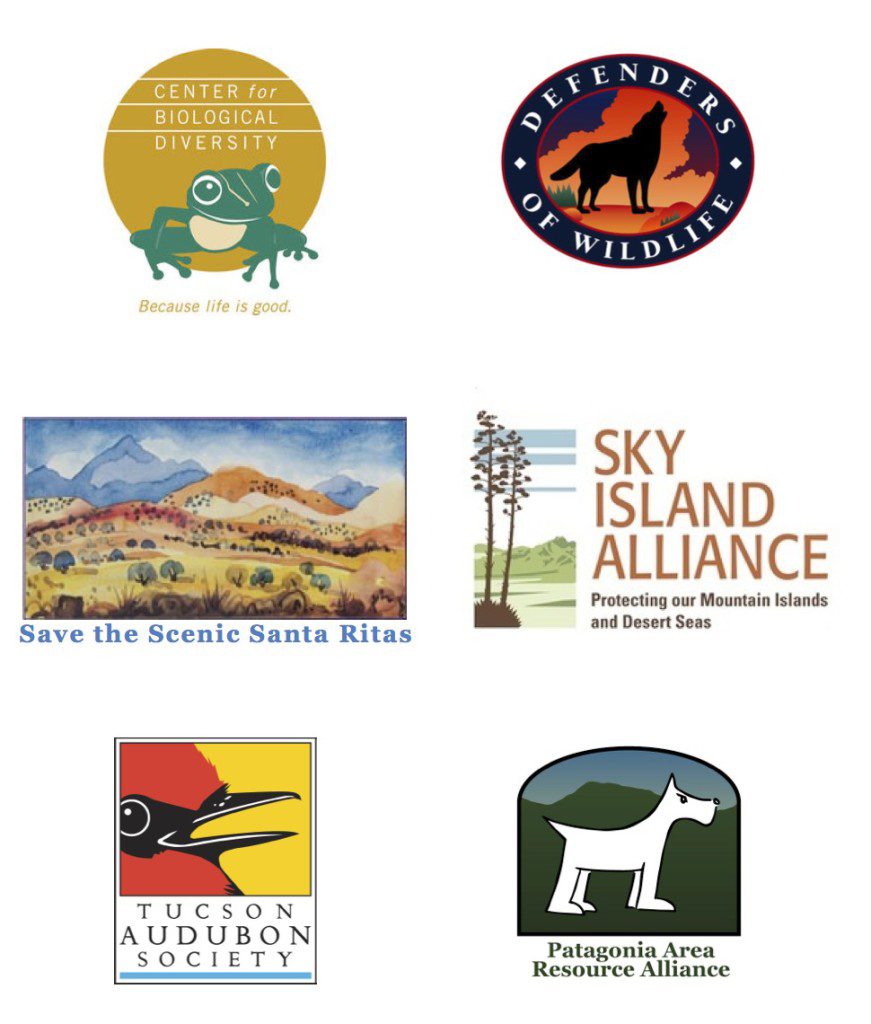

Oct 29, 2014 | Blog
FOR IMMEDIATE RELEASE
October 29, 2014
Contact: Courtney Sexton, csexton@defenders.org, 202-772-0253
Wendy Russell, wendy@patagoniaalliance.org, 520-477-2308
Groups file complaint against Forest Service and Fish and Wildlife Service for approval of mineral drilling project in Arizona’s Coronado National Forest
TUCSON, ARIZ. – Defenders of Wildlife and the Patagonia Area Resource Alliance today asked a federal court to hold the United States Forest Service and United States Fish and Wildlife Service accountable for their unlawful approval of the “Sunnyside” mineral exploration drilling project in southern Arizona’s Coronado National Forest, in the Alum Gulch area of the Patagonia Mountains. The groups say the approval of the Canadian mining company Regal Resources’ Sunnyside Project violates environmental laws and poses a potential threat to endangered species and the safety of drinking water for local residents. The Sunnyside Project involves drilling multiple exploratory holes up to 6,500 feet deep in one of the most biologically diverse mountain ranges in Arizona. The extensive drilling and construction would run 24/7 for months on end, and the total project operations could last up to 3 years.

Mexican spotted owl, ©Gooch Goodwin
The Coronado National Forest, the Patagonia Mountains and the watersheds in this region support some of the world’s most imperiled wildlife, including the jaguar, ocelot, lesser long-nosed bat, Mexican spotted owl, and yellow-billed cuckoo. Of particular concern is the Mexican spotted owl “Protected Activity Center” (PAC) in the Alum Gulch area, a site which is supposed to have the greatest protection of the law. One of the project’s proposed drilling sites is only one-tenth of a mile from the “nesting core area” of this PAC.
“The potential damage from the Sunnyside Project, especially coupled with other damaging mining projects in the region, could have devastating impacts on this imperiled wildlife and the habitat they depend on, as well as the water supply for local residents,” said Rob Peters of Defenders of Wildlife. “This is a national forest and imperiled wildlife and their habitats on the forest should be protected— not polluted by expanded drilling operations.”

Ocelot, Leopardus pardalis. photo US FWS
Patagonia area residents are dependent on water originating from Alum Gulch, an area which is also designated as critical habitat for the jaguar and Mexican spotted owl. The imperiled ocelot, lesser long-nosed bat, and yellow-billed cuckoo have also been observed near the project area.
“The Sunnyside Project could have tremendous adverse impacts on local wildlife and local residents, affecting the floodplains and the municipal watershed of the town of Patagonia,” said Wendy Russell of the Patagonia Area Resource Alliance. “The drilling will require 12,500 gallons of water per day, an amount approximately equal to ten percent of the daily water usage of the Town of Patagonia. This project threatens not only endangered wildlife, but our community’s water, health and safety.”
Click to hear from environmental attorneys on why they sue.
###
Defenders of Wildlife is dedicated to the protection of all native animals and plants in their natural communities. With more than 1.1 million members and activists, Defenders of Wildlife is a leading advocate for innovative solutions to safeguard our wildlife heritage for generations to come. For more information, visit www.defenders.org and follow us on Twitter @DefendersNews.
The Patagonia Area Resource Alliance is a citizen watchdog organization that monitors the activities of mining companies, as well as ensures government agencies’ due diligence, to make sure their actions have long-term, sustainable benefits to our public lands, our water, and the town of Patagonia. For more information visit www.patagoniaalliance.org and follow us on Twitter @PARAalliance.
Dec 22, 2011 | Blog
FOR IMMEDIATE RELEASE
Hardshell exploratory drilling threatens endangered wildlife on Coronado National Forest
Conservation groups challenge project
TUCSON, Ariz.—A coalition of conservation groups has gone to court seeking a timeout on construction of the Hardshell Project on the Coronado National Forest in southern Arizona today. The groups are challenging the U.S. Forest Service for approving exploratory mineral drilling for a planned 3,000-acre mine without required studies of how it will impact endangered wildlife and the environment.
“The Forest Service appears to have pulled a fast one on this project by approving it without first assessing its environmental impact. There’s no way to expand industrial mining activities here without causing irreversible damage to wildlife,” said Craig Miller, Defenders of Wildlife’s Southwest representative. “When you take a broad view of all the industrial mining projects the Forest Service is allowing in this area, it’s alarming that it’s being done without considering impacts on our wildlife and wild places. It’s especially serious for endangered animals like the jaguar, whose survival depends on land managers ensuring that a few wild places like the Patagonia Mountains remain intact.”
The Hardshell Project site threatens habitat for endangered Mexican spotted owls, lesser long-nosed bats, and could cut off key migration corridors for ocelots and jaguars. Yet, the ForestService approved the project after waiving the need for analyzing its environmental impact based upon groundless assumption that the drilling would have no significant environmental effects.
“The Coronado National Forest is located within the heart of the Sky Island region, one of the most ecologically diverse spots in the world,” said Jenny Neeley, conservation policy director for Sky Island Alliance. “This project will likely degrade important wildlife habitat and disrupt a critical movement corridor for the jaguar and ocelot, which are known to roam this area. The ForestService is responsible for sustaining the unique biodiversity of this region, and as part of this responsibility it is required to take a hard look at the long-term impacts of this project before allowing it to move forward.”
The groups are asking the courts to put the project on hold until the Forest Service undertakes a thorough environmental review of its impacts.
“We want the Forest Service to give this proposed drilling project the serious consideration it is due,” said Wendy Russell with the Patagonia Area Resource Alliance. “A large part of our economy depends on tourism to these wild places. More important, the project is sited along Harshaw Creek, a major source of water for the town of Patagonia. We hope the court recognizes the importance of putting this project on hold until theForest Service does the proper analysis.”
Link to Complaint
###
Contacts:
James Navarro, Defenders of Wildlife, (202) 772-0247; jnavarro@defenders.org
Jenny Neeley, Sky Island Alliance, (520) 624-7080 x13; Jenny@skyislandalliance.org
Defenders of Wildlife is dedicated to the protection of all native animals and plants in their natural communities. With more than 1 million members and activists, Defenders of Wildlife is a leading advocate for innovative solutions to safeguard our wildlife heritage for generations to come. For more information, visit www.defenders.org.
Sky Island Alliance is a grassroots non-profit organization dedicated to the protection and restoration of the rich natural heritage of native species and habitats in the Sky Island region of the southwestern United States and northwestern Mexico. For 20 years, SIA has worked with volunteers, scientists, landowners, public officials, and government agencies to establish protected areas, restore healthy landscapes, and promote public appreciation of the region’s unique biological diversity.
The Patagonia Area Resource Alliance is an unincorporated association of volunteer community members dedicated to protecting and preserving the Patagonia, Arizona area. PARA is a watchdog organization that monitors the activities of industrial developers such as mining corporations, as well as government agencies, to make sure their actions have long- term, sustainable benefits to our public lands, our watershed, and our town. PARA is also committed to outreach and education within our community on the potential negative impacts hard rock mining could have on our surrounding ecosystems and to our growing eco-tourism based economy.

 The Patagonia Area Resource Alliance and Defenders of Wildlife were in federal court in Tucson last Thursday to present oral arguments against the Forest Service’s unlawful approval of a mining exploration project in the Patagonia Mountains on the Coronado National Forest.
The Patagonia Area Resource Alliance and Defenders of Wildlife were in federal court in Tucson last Thursday to present oral arguments against the Forest Service’s unlawful approval of a mining exploration project in the Patagonia Mountains on the Coronado National Forest.








